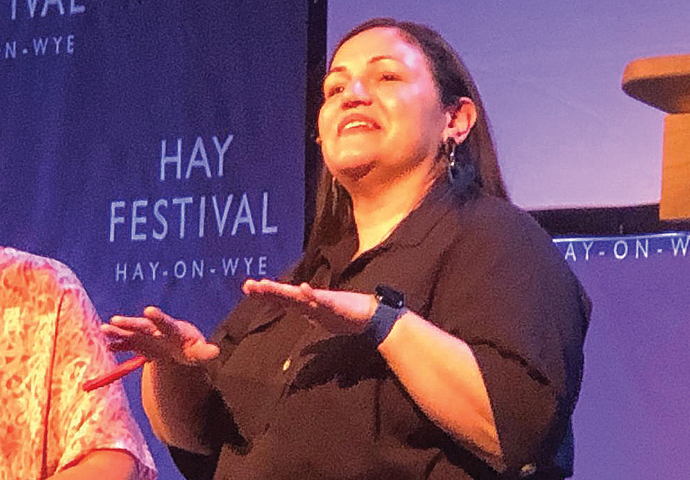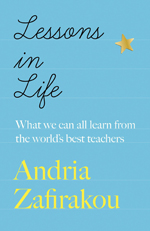Hay Festival: Meet The World’s Greatest Teacher
Andria Zafirakou, author of Lessons in Life, talks about the trials of school inspections
Thursday, 8th June 2023 — By Dan Carrier

Andria Zafirakou: ‘We need to stop asking young people what they want to be when they grow up, but who they want to be’
YOU can be awarded The World’s Greatest Teacher and scoop a $1million pot for a classroom project of your choosing – but still the word Ofsted chills the heart, according to teacher and author Andria Zafirakou.
Andria, who won the global teacher award three years ago, was talking at this year’s Hay Festival – and she told a sell-out audience the effect external inspectors have on teachers and their schools.
“Ofsted – every time that word is said you feel anxious,” she said. “It does not matter how good your school is. It is like constant high stakes and it simply does not need to be like this.”
Calling for a widespread re-think regarding standards and inspections, she said schools benefit from the experience inspectors offered – but the relationship must be reformed.
“You need an outside development partner or inspector – but it does not have to be as fierce as Ofsted,” she said. “There needs to be quality auditors to help us learn and develop better and to make sure schools improve and share best practice. This is not how it works today.”
Andria grew up in Camden Town and while teaching at the Appleton Community School in Brent was awarded the Global Teacher Prize, chosen from 33,000 nominees. She used the money to set up an artist-in-residence project, bringing established artists into schools to work directly with students. At Acland Burghley in Tufnell Park, Turner Prize winner Mark Wallinger ran workshops.
Her latest book, Lessons In Life, focuses on the stories of 30 inspiring teachers around the world. Andria found educators with ideas, who had common experiences no matter where they were teaching, and had developed insights into ways to nurture young people to help them become fully rounded adults.
“I chose people who have had incredible experiences in the classroom,” she said. “Their stories go untold. If we do not get to share educators’ stories, stories of life-changing experiences, then you cannot learn from them. Sometimes you get lost in your own context but talking to people across the world teaches you a lot. And I thought we had it tough in the UK, but some of the stories were eye-openers.”
The obstacles teachers and pupils face today have been added to by a multitude of factors, ranging from the lack of investment over the past 13 years – and similarly damaging cuts in other areas such as social housing.
“Teachers have so many pressures to deliver the curriculum,” she added. “Students have to be seen to progress and if they don’t, you are asked why.”
This means teachers need the time and resources to look at each student individually and work out how they can do their very best.
“It is purely a cost issue. There is no short cut,” she said. “You need to look at each child, and employ a triage approach. In a class of 12-year-olds, you are likely to have a reading range between six and 16 years. You have to consider how one person can provide the excellent teaching each child in that class deserves.”
While every school has a unique set of circumstances relating to their intakes, Andria says the government could be much better at reacting to challenges and long-term planning.
“Firstly – stop giving teachers more to do,” she said. “Take away the extra stuff. We are not their parents – and that demarcation is important. “The Department for Education could at a stroke improve our schools by releasing pressure put on teachers. The breadth of our work is never fully acknowledged.”

Ensuring standards remain as high as possible has to include evolving to meet the changing needs of students, providing the tools they need not just for work but to become actively good citizens.
“I teach learning skills and I need to be learning too,” she added. “You cannot teach the same way you did 15 years ago. You have to evolve and teach in new ways.
“You have to make sure lessons are inspiring, happy, inclusive, inquisitive. You need to make sure they are motivated. This means you open up your lessons and do not limit your choices.
“But currently, there is not enough support or guidance to look at these questions.”
She spoke of the schism between the political appointee as Minister for Education, held by MPs with no teaching experience and who send their children to highly privileged, bumper-resourced, feepaying schools, is immense. It means teachers have to work with a government that appears to simply not understand basic educational aims. It’s not about creating an economic unit who can be exploited, but a happy, rounded adult who leads a fulfilling life.
“We wish we were trusted more in the classroom,” said Andria. “We have done a degree, and then a post graduate degree. They need to trust our judgement.”
Her book has helped her focus her thoughts – and she says the lessons inside can act as a tool kit. “I want as much advice and others’ shared experiences as possible. I ask: what do I need to know to help me in my classroom?” she added.
An art teacher, she knows from her experience how students can be discouraged from studying the arts and humanities due to the incorrect perception that jobs today need a focus on maths and sciences.
“I was told not to do art GCSE and I had no idea what careers there could be in art,” she recalls. It was partly behind her plan to spend her prize money on bringing artists in to schools.
“I thought it would bring art in classes and make it feel real. You cannot teach the joy of the language of an artist, so I wanted to bring the artist in to show what they can do. It is a case of a child seeing their future self in front of them in another human being,” she said.
And above all, we need to consider how we approach the nurturing of young people.
“We need to stop asking young people what they want to be when they grow up, but who they want to be. That is very important,” she said.
“My classroom has changed over the past 10 years. I am finding young people seeking new and different professions, living very different lives and learning a whole new language. We are not developing people good at maths, we are developing human beings.
“Young people are asking different and difficult questions – questions, for example, about their identity, about the climate crisis. We need to be listening.”
• Lessons In Life. By Andria Zafirakou. Quercus Publishing, £18.99